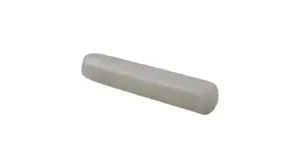- Semi-finished products
- Sheets
- Solid rods
- Solid rods PVC overview
- Solid rods PE
- Solid rods PP
- Solid rods PET
- Solid rods PBT
- Solid rods ABS
- Solid rods PMMA
- Solid rods PC
- Solid rods PA overview
- Solid rods POM
- Solid rods PSU
- Solid rods PPSU
- Solid rods PEI
- Solid rods PEEK
- Solid rods PVDF
- Solid rods ECTFE
- Solid rods PCTFE
- Solid rods FEP
- Solid rods PFA
- Solid rods ETFE
- Solid Rods PTFE
- Hollow rods
- 4-edge, flat, 6-edge bars
- Transparent tubes
- Standard profiles
- Foils
- Molded tubes
- Welding consumables
- Sustainable plastics
- Delivery Overview Semi-Finished Products
- Finished parts
- Ventilation mouldings
- Elbows and Sockets
- Tees
- Flanges
- Control Dampers, Control Shut-Off Dampers
- Throttle and Shut-Off Valves
- Throttle Valve with Handle, Socket on both Sides
- Butterfly Valve with Handle, Double-Flanged
- Throttle Valve Socket and Knob
- Butterfly Valve, Flange, and Rotary Knob
- Butterfly Valve Flange and Stepless Rotary Knob
- Throttle Valve Socket and Knob, Stepless
- Butterfly Valve, Hand Lever, Flange, 15° Detent
- Butterfly Valve Rotary Knob Socket 15° Grid
- Butterfly Valve Rotary Knob Flange 15° Grid
- Damper valve, continuously adjustable rotary knob, socket, 15° detent
- Butterfly valve, stepless rotary knob, flange, 15° detent
- Pipe Silencer with Socket or Flange
- Pipe Silencer with Flange, Baffle Length 500 Mm
- Pipe Silencer with Flange, Baffle Length 750 Mm
- Duct Silencer with Flange, Baffle Length 1000 Mm
- Pipe Silencer with Flange, Baffle Length 1250 Mm
- Pipe Silencer with Flange, Baffle Length 1500 Mm
- Pipe Silencer with Flange, Baffle Length 1750 Mm
- Pipe Silencer with Flange, Baffle Length 2000 Mm
- Pipe Silencer with Sleeve, Baffle Length 500 Mm
- Pipe Silencer with Socket, Baffle Length 750 Mm
- Pipe Silencer with Sleeve, Baffle Length 1000 Mm
- Pipe Silencer with Socket, Baffle Length 1250 Mm
- Duct Silencer with Socket, Baffle Length 1500 Mm
- Pipe Silencer with Sleeve, Baffle Length 1750 Mm
- Pipe Silencer with Socket, Baffle Length 2000 Mm
- Rain Hoods
- Ventilation Pipes
- Tee Plastic breech
- Saddle Branch
- Deflector Hood
- Roof Attachment 0° – 45°
- Slotted Gate Valve
- Backflow Caps
- Louvered Damper Flap
- Wall Penetration
- Bird Protection Grid, Chamfered at 30°
- End Cap with Socket
- Inspection Port
- Duct Stiffener
- PVC Spiral Hose
- Supply and Exhaust Air Grilles
- Machines & devices
- Hot air/warm gas welding devices
- Hot Air S
- MINI-Electronic and MINI-Electronic-SC
- Grand – S – Electronic
- Quick-S Elektronic
- Quick-L-switchable
- Hot Air Quick-L-electronic Forsthoff
- Quick-L-Electronic Potentiometer
- Oval-Q
- Oval-H
- Robust-L
- Hot Gas Welding User Sets
- APX100
- APX300
- Welding gun 200
- Welding gun 500 digital
- Hot Gas Welding Gun HSK700 – Penweld 505-A
- Hot air welding machines
- Welding nozzles
- Welding extruder
- Welding extruder HSK10 DE digital
- Welding extruder HSK10.2 DE digital compact
- Welding extruder HSK18 E
- HSK18 RSX welding extruder
- Welding extruder HSK22 RSX DATA
- HSK26 GSX welding extruder
- Welding extruder HSK28 RSX DATA
- Welding extruder HSK40 E
- HSK40 RSX welding extruder
- Welding extruder HSK60 DE
- Welding extruder HSK60 DE Granules
- Welding extruder HSK60.1 DE Granules
- Welding extruder heat protection
- Welding extruder transport case
- Welding wire extruder line
- Air compressor
- Air heater
- Welding mirror
- Socket welders
- Panel benders overview
- Panel bending machines
- Butt welding machines overview
- Plate welding machines
- Pipe welding machines
- Pipe band saw overview
- Orbital saw
- Auxiliary equipment
- Testing technology
- Hot air/warm gas welding devices
- Resources

